Influencer marketing is one of the most effective ways to expand your company’s reach, increase your credibility in your industry, and establish yourself as a thought leader within your field of expertise.

In this article you’ll learn eight strategies for becoming an influencer in your field, finding other influencers, and using your influencing skills to get people to sit up and pay attention to what you have to say.
Before we dive into that, though, let’s quickly talk about what influencer marketing really means.
What Is Influencer Marketing?
Influencer marketing is a way to leverage the status of an individual within your organization to boost the profile and standing of the company as a whole. Many influencers also use their status and reach to launch their own companies or consulting businesses.
Many of the world’s leading influencers’ names are synonymous with those of their organizations. WordStream’s own founder and Chief Technology Officer, Larry Kim, is considered an influencer in the paid search, content marketing, and social media spaces. Larry frequently speaks at conferences around the world, and his extensive knowledge and thought leadership in search has elevated not only his own profile, but that of WordStream as a company.
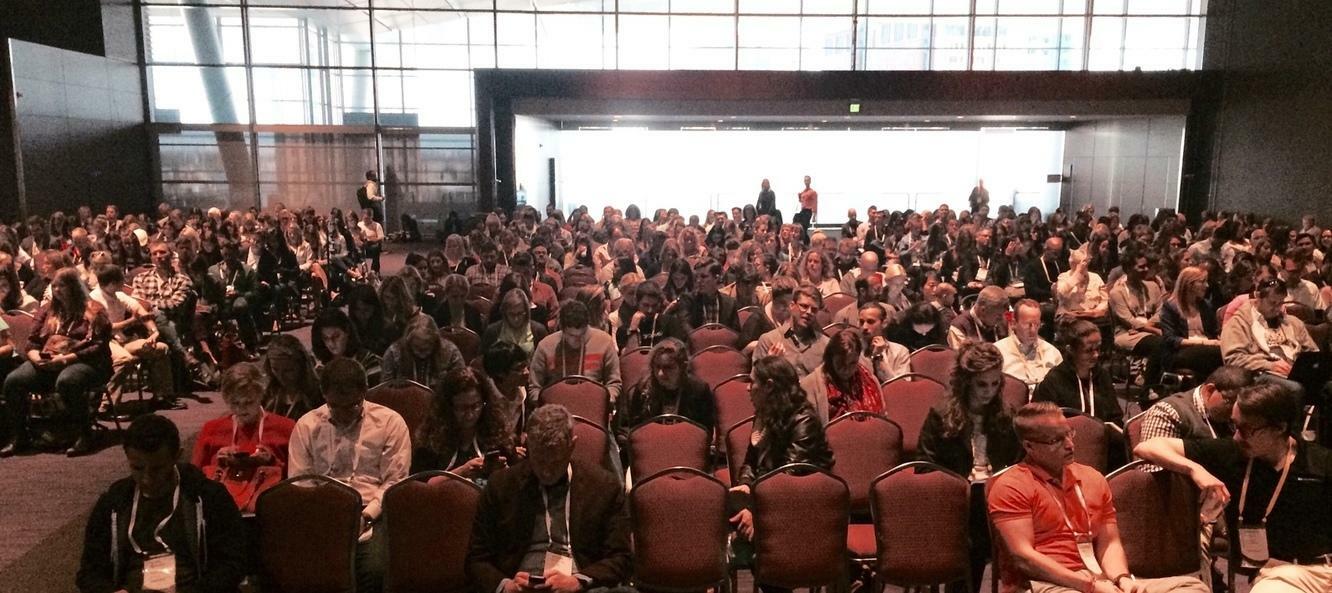
The audience eagerly awaiting Larry’s paid search presentation at Inbound 2014
However, influencer marketing isn’t merely capitalizing on someone’s image to increase sales. More often, influencer marketing is about establishing that individual as a trusted authority in their area of expertise and defining the conversations that center around a given topic; in Larry’s case, paid search, content marketing, and social media.
So, if influencer marketing is using the status of a single individual to influence others, but isn’t solely used to gain leads or increase sales, then what is it? How can you become an influencer? And how can you create marketing campaigns that speak to influencers in your industry?
Here are eight influencer marketing strategies that will increase your visibility in your industry and make people want to know you.
Influencer Marketing Strategy #1: Find Influencers in Your Industry
Although you probably already have an idea of who the movers and shakers are in your field, you need to find – and follow – these key people to see what they’re talking about.
How to find influencers
Social media is hands-down the easiest way to find influencers. Do a search by topic to identify conversations and see who is making their voice heard. Follow influential people, and check out who they follow. Participate in regular conversations relevant to your industry (like, say, the weekly #ppcchat discussion on Twitter).
Alternatively, you can use free online tools like BuzzSumo and Topsy to see who’s sharing your content (or anyone else’s content), as well as how influential they are. In Topsy, simply enter the URL of a piece of content and check out the results:
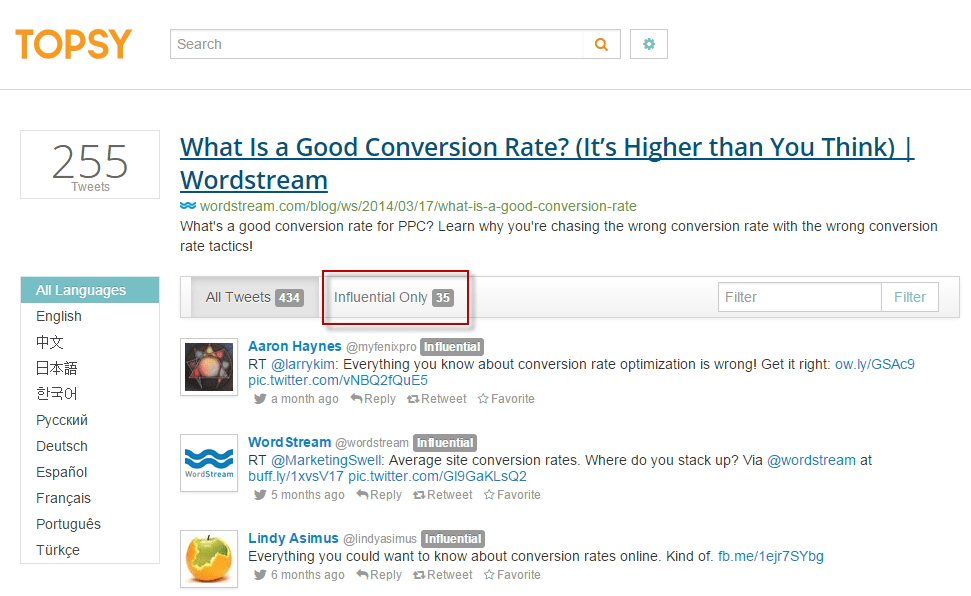
For BuzzSumo users, it’s just as easy to identify influential people and the content they’re sharing. Click on the “Influencers” tab at the top of the page, enter your search terms (in this example, “PPC”), and check out the results.
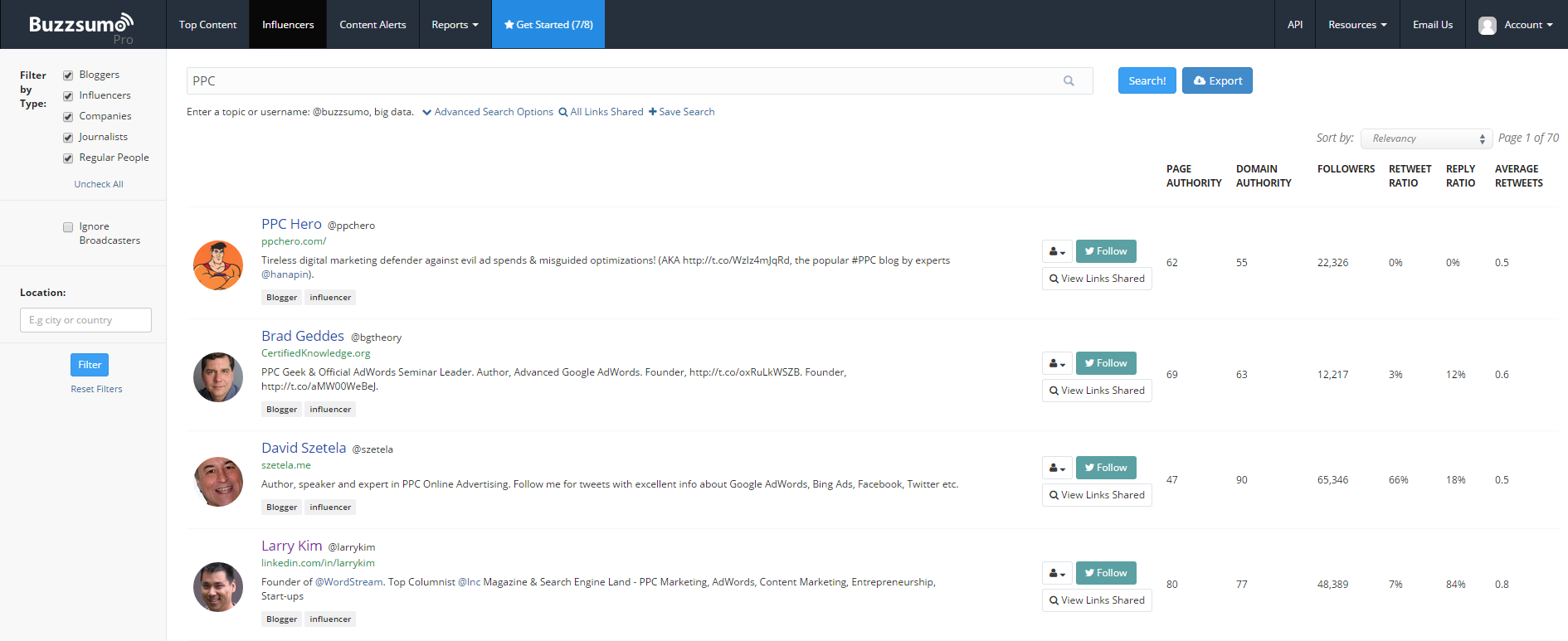
You can sort results by several criteria, such as page and domain authority, followers, retweet ratio, and average retweets.
There are other things you can do to identify influencers in your field. Identify conferences that are relevant to your industry and check out the list of speakers. Ever notice that the same people tend to crop up in a variety of industry publications as columnists and guest posters? These individuals are probably influencers. What names do you hear over and over again in your field? Which articles are constantly being linked back to?
Even a little research will quickly yield a list of influencers whom you should follow and listen to.
RELATED: 19 PPC Influencers You Need to Follow (& Their Best Advice)
Influencer Marketing Strategy #2: Shape the Conversation
Before you can become an influencer, it’s important to realize that advocating for a cause or subject area is not the same as being influential. You can be the world’s biggest cheerleader for content marketing, for example, but that doesn’t necessarily make you a content marketing influencer.

Image via womma.org
To be perceived as a genuine influencer in a given area, you need to shape and define the conversation, not just advocate for whatever it is that’s being discussed. Are you asking questions that nobody else has thought of (or dared to ask), or are you just repeating what others have said? Is your take on a topic genuinely new, or are you publishing content about the same things as everyone else? Do your ideas and opinions challenge existing conventions about your industry, or do they get lost in the noise?
If you want to become an influencer and reach individuals who are already considered influential in your field, you have to define the conversation, not just nod your head.
Influencer Marketing Strategy #3: Own Your Niche
If you’re going to become an authority in your industry, you need to own your niche. It isn’t enough to know a great deal about a few subjects – you need to zero in on one hyper-specific area of focus and make it yours.
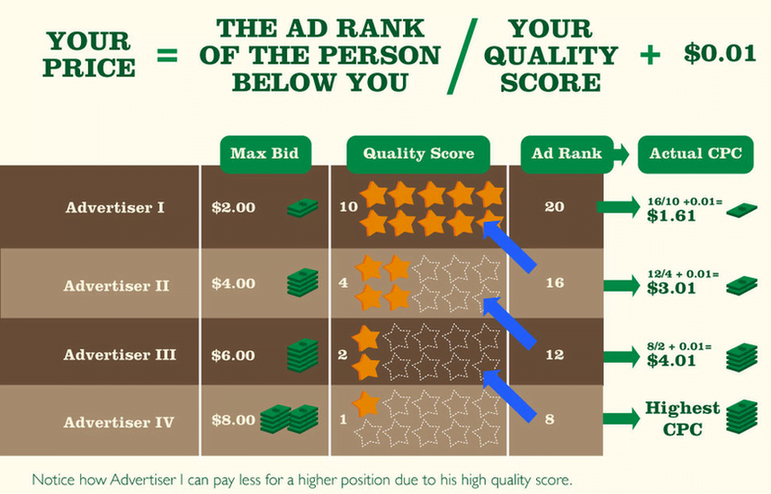
A couple of years ago, Larry started discussing the AdWords Quality Score algorithm. Some people dismissed his work on Quality Score, claiming it wasn’t important enough to warrant the kind of attention Larry was devoting to it.
They were wrong.
Larry’s examination of Quality Score, and what it means for AdWords advertisers, is a prime example of owning your niche. Rather than publish content (and host webinars, and speak at conferences) about paid search in general, Larry owned his niche by refining his area of focus even further to Quality Score. Today, Larry is considered one of the most knowledgeable people in the world when it comes to paid search, but he owned an already specialized topic and set to work proving himself as an expert in one of several specific areas – one that many people had overlooked or written off.
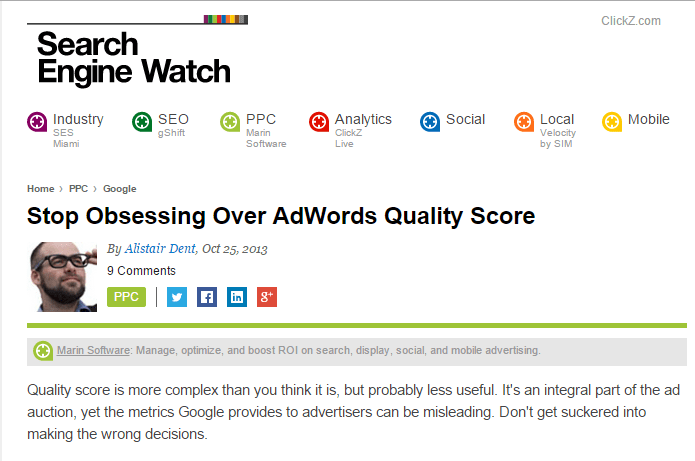
You can read Alistair’s piece here, and Larry’s rebuttal here.
In addition, Larry’s authoritative Quality Score content even prompted Google to address the issue of Quality Score in AdWords.
“When it comes to the details of how exactly the AdWords auction works, for obvious reasons, they would prefer not to give away the secret sauce,” Larry says. “Our research pointed out some obvious loopholes in their literature and they were forced to update it. You know how I know? They didn’t update their Quality Score info for six years. Then, just a few months after my Quality Score bonanza (I think we published 50 or so articles on the topic, as well as a few dozen conference sessions), they update their Quality Score info and released a new white paper called “Settling the Quality Score” (that sounds like a response to something, doesn’t it?). While I’m not called out by name in the refresh, they do refute and confirm specific points that I’ve brought up in the past.”
Influencer Marketing Strategy #4: Aim to Influence the Influencers
Many people assume that to become an effective and respected influencer in their field, they have to reach as many people as possible. However, things are a little more complicated than that.
Influencer marketing isn’t just about reaching a lot of people – it’s about reaching the right people. After all, you’ll need at least the implicit endorsement of other experts in your field if your ideas are to gain any traction.

This doesn’t mean carpet-bombing the entirety of Twitter with links to your latest brilliant blog post, but making sure the right people see your content and amplify it. The first thing you should do? Start sharing other influencers’ content.
“First, take an interest in amplifying other people’s content,” says Larry. “The principle of reciprocity says that people are more likely to take an interest in your stuff if you take an interest in their stuff first.”
Remember – reach is not the same as influence. It’s more important your content reaches the right people than the most people.
Influencer Marketing Strategy #5: Do What Works For You, Not Your Peers
When you’re trying to make a name for yourself, it’s all too easy to look at tactics and strategies your peers (or personal heroes) are using and adopt them for your own purposes. While this might work sometimes, blatantly copying someone else’s approach to influencer marketing won’t always have the desired results. In some cases, it could even harm your personal brand and damage your credibility.

Rather than ape someone else’s techniques for establishing yourself as an influencer, focus on the content you’re producing. However, don’t just provide quality content to your regular audience – also focus on creating compelling, original content designed specifically to attract the attention of influencers in your industry.
“Create content that is specifically designed to attract the attention of influencers,” says Larry. “For example, we produced original research on Quality Score, click-through rates, and conversion rates last year. This data ended up in hundreds of podcasts, articles, conference sessions, Rand Fishkin’s presentations, etc. because it was new stuff. That’s what influencers do – they share new, interesting content with their audiences.”
You can get citations from big-name influencers if and only if you create content that’s worth citing.
Influencer Marketing Strategy #6: Build a Happy Community
So, we’ve established that sharing other influencers’ content and creating your own original content are both crucial to influencer marketing, but one pitfall that many people make – even renowned experts – is failing to appreciate the importance of community in their industry.

Please don’t do this in meetings.
Communities – Armies of Cheerleaders (or an Angry Mob with Torches and Pitchforks)
Targeting influencers with your content is essential, but don’t overlook the “little people”; the loyal blog readers who subscribe to your newsletter, retweet your tweets, and leave enthusiastic comments on your posts.
Sure, the small-business owner who always reads your content might not be the most influential follower you have, but without her, you won’t get far as an influencer. As we already discussed, a large following isn’t the sole objective, but it definitely helps. Also remember that negative interactions tend to spread far more quickly and have considerably more impact than positive ones. Blow someone off, and you could regret it.

Not All Communities Are Alike
Even if your content is exceptional, you need to remember that people interact with you and your brand in different ways. Yes, you should be creating content to attract the attention of other influencers, but a keen understanding of the community in your industry is crucial to expanding your reach and making an impact, one of the many excellent points made by Moz’s Senior Community Manager Erica McGillivray in her interview with Elisa from last year (read the full interview here).
Don’t Be ‘That Guy’
Another point worth mentioning here is controversy. Some marketers believe that being deliberately controversial or inflammatory is an excellent way to raise their profile (and therefore, their reach). While this can be true, it’s also a slippery slope, as the community in your field may not respond positively to contentious positions. Contrarian content marketing can be effective, but it’s also something of a touchy subject, depending on the topic in question.

Don’t be ‘that guy.’
You shouldn’t exclusively pander to your audience or community, but avoid being controversial for its own sake – the community will remember, and your reputation is everything. If in doubt, err on the side of caution.
Influencer Marketing Strategy #7: Be Genuine, Accessible, and Responsive
Social media has transformed the way people interact online. This means that, misguidedly or otherwise, people expect to be able to directly access the people they follow and respect.
I’m not suggesting that you respond to every single tweet or personally reply to every mention on Google+, but I am recommending that you avoid becoming the kind of influencer who only tweets links to their content and never interacts with their followers. If you use social media analytics tool BuzzSumo, you’ll already know the name of these individuals – broadcasters.
Projecting an image of accessibility can go a long way toward improving your standing and increasing your visibility in your field. Social media is an immensely powerful tool in influencer marketing, but don’t forget the “social” part of social media. Interact with your followers, and be an active part of the community.
Also, don’t be afraid to show a little humanity in your online presence. Rand Fishkin’s raw, honest post about his struggles with depression and the pressures of growing a business struck a powerful chord with Moz’s audience (myself included), and helped remind the SEO and digital marketing communities that we’re all human.
This kind of honesty and transparency makes it easier for people to connect with you on another level beyond the professional, and shows a more relatable side of you as a person. A great example of this is Larry’s tweets about his young son, Julian, whom Larry jokingly dubbed #ppckid on Twitter:

Sure, these types of tweets might not “perform” as strongly as those focusing on Larry’s content (a point Larry made in his recent post about Twitter Analytics), but that’s not the point. People want to learn from you, but they also want to get to know you.
You’re a person, not a robot – act accordingly.
Influencer Marketing Strategy #8: Be Patient
Success rarely happens overnight, and this maxim most definitely applies to influencer marketing.
In many ways, becoming an influencer in your field is similar to content marketing as a discipline. Many would-be influencers give up out of frustration, having shared the very best content they could, for a long time, with little or no tangible results. With this in mind, check out this interesting graph from one of Rand’s SlideShare decks on why content marketing fails:
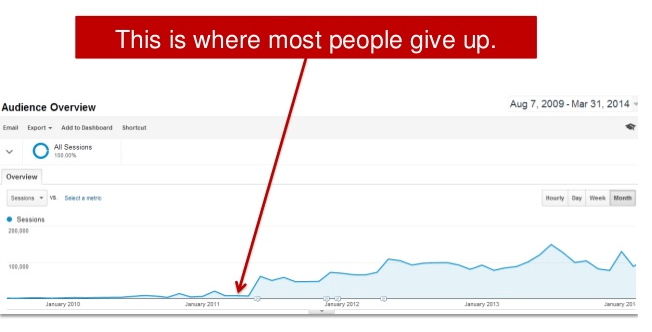
Just as many businesses give up on content marketing right before the payoff, many would-be influencers lack the patience and discipline to go the distance and keep publishing.
Take Larry and WordStream, for example. Larry started blogging around 2009. Imagine if he had given up in 2011, just two years later. In 2012, the WordStream blog and Larry himself began to receive a great deal more exposure in the paid search industry as a result of hard work and consistent effort. External recognition such as press pickups and even television interviews followed this considerable increase in blog traffic.

Larry – and WordStream, by association – wouldn’t be where he is today if he hadn’t persevered.
If you want to become an influencer in your field, you have to be willing to put in the hours (and days, weeks, months, maybe even years) it takes to establish a name for yourself. This will be hard, and you will be tempted to throw in the towel at some point, but you must persevere if you’re going to succeed. Good things come to those who wait.
3 Influencer Marketing Examples
Now that we’ve learned some lessons about how to make a name for yourself, let’s look at a few examples of influencer marketing in action.
1. Influencer Marketing Example #1:Seth Godin
Seth Godin is one of the best examples of an influencer and thought leader in the marketing and entrepreneurial space. Few people have been blogging about marketing and business longer than Seth, and his blog attracts countless readers every month. However, it’s rare to see lengthy blog posts over at his blog, as he spends a lot of time writing best-selling books. That doesn’t, however, diminish his influence in the industry. Seth Godin is proof that perseverance, genuinely insightful opinions, and subject matter expertise are a powerful combination.
2. Influencer Marketing Example #2: Ann Handley

Ann Handley, influencer extraordinaire
In addition to being the Chief Content Officer at the Content Marketing Institute, Ann Handley is also a profilic writer, having published several books about what makes great content, well, great. Ann is another fantastic example of an influencer, as not only is she highly respected for her considerable experience in the field, her opinions and insights into content marketing genuinely shape the conversation.
3. Influencer Marketing Example #3: Bryan Eisenberg
No list of influencer marketing examples would be complete without mentioning Bryan Eisenberg. Widely regarded as one of the world’s leading authorities on conversion rate optimization, Bryan speaks at conferences around the world, publishes books, and hosts outstanding webinars about all things CRO. When Bryan speaks, people listen, and his blog is well worth checking out (if you aren’t a regular reader already).
Use These Influencer Marketing Examples and Strategies to Build Your Online Presence
Influencer marketing is a powerful tool in today’s highly competitive marketing world. Unfortunately, there is no one-size-fits-all approach to influencer marketing. You have to be willing to try new things and see what works and what doesn’t in your specific niche.








